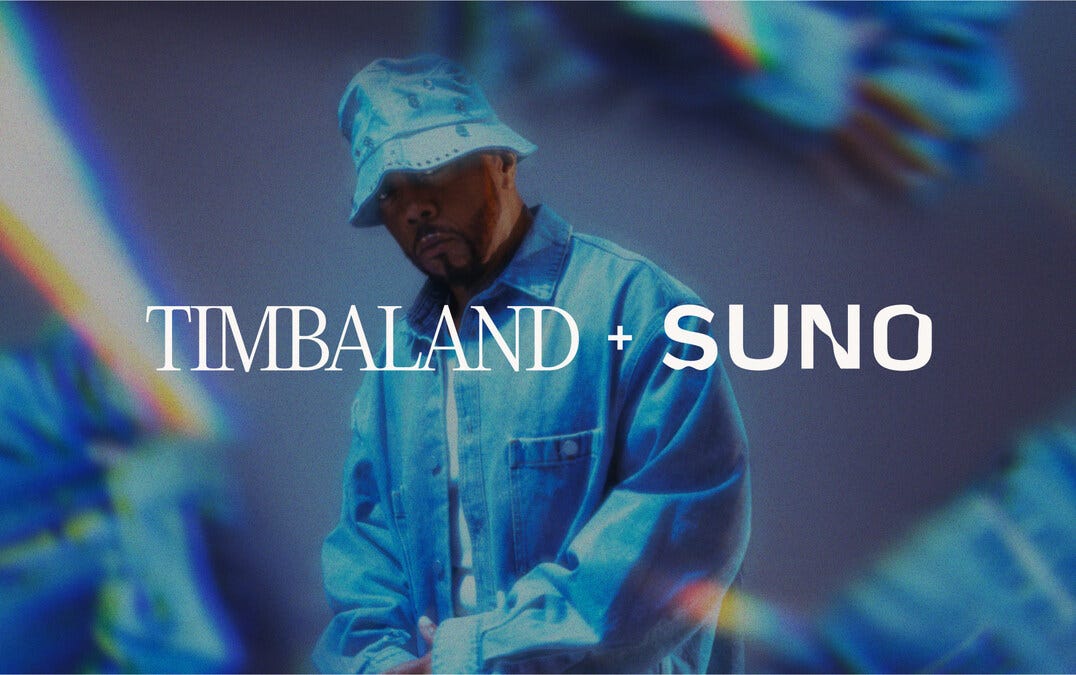Decoding the Algorithms | How AI Music Platforms Decide What 'Good Music' Means 🤳🏻🎼
The Hidden Biases Shaping the Future of Musical Taste
When Timbaland fed a beat into Suno AI and generated a "NEW" track without permission from the original creator, he inadvertently exposed something far more troubling than copyright infringement.
He revealed how artificial intelligence is quietly re-defining what constitutes "good music," and the implications reach far beyond any single lawsuit.With ~25 million users now creating music on Suno alone, and 82% of listeners unable to distinguish between human and AI-generated tracks, we are witnessing an unprecedented shift in how musical taste is formed. But beneath the blatant lie of democratizing music through AI lies a deeper, more complex reality:
Algorithms trained on biased datasets are making profound aesthetic judgments that could re-shape global musical culture for generations.
The Algorithm's Aesthetic Compass
When Udio's co-founders were asked about their training data, they offered a telling response. They said
"they train on a large amount of publicly-available and high-quality music".
That phrase, "high-quality music," sounds innocuous enough; but it reveals the fundamental problem with AI music generation. Someone, somewhere, had to decide what constitutes quality. And that someone wasn't representing the full spectrum of human musical expression.
The numbers tell a stark story. According to researchers at Abu Dhabi's Mohamed bin Zayed University of Artificial Intelligence, 94% of generative music model training data comes from Western genres. Meanwhile, Africa contributes just 0.3% of this data, the Middle East 0.4%, and South Asia 0.9%. When we examine the broader landscape of AI music research, approximately 86% of total hours in available datasets focus on music from the Global North, while only 6.1% of research papers are authored by researchers from Global South countries.
This isn't merely a representation issue; it's an aesthetic colonization. AI systems learn patterns, structures, and what David Ding, Udio's CEO, calls
"common elements across music such as music theory, rhythm, and recording technology."
But WHOSE music theory? WHICH rhythmic traditions? WHAT recording standards?
The Mathematics of Musical Taste
AI music generators work by identifying patterns in existing songs, then using that information to create “new” compositions. This process inherently prioritizes what researchers call "mathematical precision over emotional depth." The result is music that sounds technically proficient but lacks the cultural context and lived experience that gives authentic music its power.
As one analysis noted,
"AI-generated music often prioritizes mathematical precision over emotional depth, leading to tracks that sound polished but lack individuality."
This mathematical approach to creativity means AI systems are optimizing for what algorithms can measure; chord progressions, tempo consistency, production quality etc. rather than what humans actually value in music. I.e. emotional resonance, cultural significance, and artistic innovation.
The danger isn't just aesthetic blandness. When AI systems optimize for "streaming metrics and algorithmic engagement," we risk a future where
"all music sounds like the mathematical average of what performed well in the past."
The weird, challenging, and genuinely innovative work that pushes culture forward may be systematically filtered out in favour of AI-optimized content designed to trigger dopamine rather than inspire thought.
The Homogenization Machine
Suno CEO Mikey Shulman revealed the platform's underlying philosophy when he suggested that the company would correct a "lopsided" imbalance between people who listen to music and those who make it (WTF 🤷🏼♂️). His goal is to
"get a billion people much more engaged with music than they are now."
But Shulman's dismissive attitude toward the creative process (Full interview here) itself is telling; he claimed that
"the majority of people don't enjoy the majority of the time they spend making music."
This perspective treats music creation as an inefficiency to be solved rather than as an inherently valuable human expression. When a majority of internet users will use AI to discover new music, and when these discovery algorithms are trained on culturally biased datasets, we’re not just changing how music is made; we are changing how musical taste is formed.
The risk of what experts call "cultural homogenization" is already materializing. As AI models become more sophisticated at generating "radio-ready" tracks, they are simultaneously becoming more effective at erasing musical traditions that don't fit Western commercial patterns.
Traditional African drumming, Middle Eastern maqams, South Asian ragas etc. These complex musical systems become statistical noise in datasets dominated by Western pop structures.
The Cultural Cost of Convenience
Living Colour guitarist Vernon Reid captured the deeper issue when he observed that AI-generated music separates sound from its "historical human drama." Music isn't just organized sound; it's the expression of lived experience, struggle, and authentic emotion. AI can simulate the patterns of blues, for instance, but it can't replicate the pain and resilience that created them.
This cultural flattening has practical consequences. When Western-centric AI systems become the dominant tools for music discovery and creation, they don't just reflect existing biases, they amplify them. As researchers noted,
"Western-centric biases may perpetuate and amplify existing biases in downstream applications, such as recommendation systems or cultural writing, further entrenching human-produced biases."
The result is a feedback loop where algorithmic taste-making reinforces its own narrow aesthetic choices. Users create music using AI tools trained on Western datasets, which then generates more Western-influenced content, which then trains future AI systems to further prioritize those same patterns.
The Economics of Algorithmic Music
The economic implications are equally troubling.
In 2022, 80% of artists on Spotify had fewer than 50 monthly listeners.
Now imagine how those numbers change when users can generate hundreds of songs in minutes using AI platforms.
The technology isn't just competing with human artists, it's flooding the market with infinite content that makes human work even harder to discover.
When Udio processes user requests "at a pace of 10 songs every second," the sheer volume threatens to drown out human creativity. More concerning is that this algorithmic flood is shaped by the same biased training data that privileges certain musical traditions over others.
Toward Algorithmic Awareness
The path forward requires recognizing that AI music platforms aren't neutral tools. They are cultural institutions with enormous power to shape musical taste. When these platforms claim to use "high-quality" training data, we must ask, quality according to whom? When they promise to "democratize" music creation, we must examine whether they're actually centralizing aesthetic control in the hands of algorithm designers.
The solution isn't to perfect AI music generation, but to re-direct this powerful technology toward a more meaningful purpose like assisting human creativity; rather than replacing it.
Instead of training AI to compose entire songs, we should focus on developing tools that help musicians with disabilities access instruments and recording technology, restore damaged historical recordings, and provide creative assistance that enhances rather than substitutes human artistry.
The future of music shouldn't just be algorithms determined by which genres happened to dominate English-language internet archives, it should remain firmly in human hands. As AI becomes more sophisticated, its greatest contribution won't be flooding streaming platforms with algorithmic compositions, but rather ensuring that every creative human being; regardless of physical ability, economic background, or technical skill has access to the tools they need to express their authentic musical voice.
Preserving the full spectrum of human musical expression means celebrating human creativity, not automating it away.
🫵🏼 What’s YOUR experience with AI music tools? Have you noticed patterns in the music they generate?
💬 Share YOUR thoughts in the comments below! Your observations could help shape how we think about algorithmic creativity.
🤝🏼 Join us at Vinyl Culture as we continue exploring ways to preserve and evolve an authentic music culture in an age dominated by algorithms and corporate interests.
5️⃣0️⃣0️⃣+ SUBSCRIBERS have now joined our mission to protect The Soul of Music in the age of algorithmic manipulation & AI. Thanks a lot to each & every one of you!! 🫵🏼 🤝🏼🙌🏻 Together, we can make a difference.








As an artist I have nothing but horror and disdain for the despicable moves labels and streaming platforms are instigating with AI. It is a curse to music, culture and humanity.
AI is trash. No other way to put it.